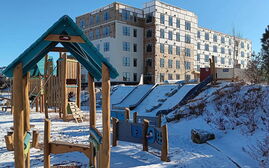Co-op development is surprise pick for Portland Douglass Street lot
 Courtesy / City of Portland
The design for Douglass Commons, bordered by Congress and Douglass streets in Portland's Libbytown neighborhood. includes buildings with co-op homes, as well as an apartment building. Insterstate 295 is at the bottom.
Courtesy / City of Portland
The design for Douglass Commons, bordered by Congress and Douglass streets in Portland's Libbytown neighborhood. includes buildings with co-op homes, as well as an apartment building. Insterstate 295 is at the bottom.
A proposal that will include the city's second cooperative housing development came to the Portland City Council meeting as the dark horse Monday night, but left the winner after councilors said it addresses the need for middle-income housing.
A 108-unit project on Douglass Street, Douglass Commons, proposed by Maine Cooperative Development Partners and Szanton Co., will have 56 cooperative ownership units in several buildings on the 3.24-acre site where West School once stood. There will also be 52 apartments.
The council's Economic Development Committee in August recommended a different project, proposed by Avesta Housing, Hebert Construction and Jack Soley. The Douglass Yard development included a 40-unit apartment building, a 30-unit condominium building and 10 single-family homes.
But members of the Housing Committee said in July they favored the Szanton/Maine Cooperative project. So both were presented to the council for the go-ahead to enter into a purchase-and-sale agreement for the city land on Monday.
Councilors who supported the Douglass Commons proposal said its key difference was an aim to provide housing for the "missing middle" — those who can't afford the city's high housing prices, but make too much money to qualify for the limited amount of housing available to low-income residents.
"It's about pioneering affordable, stable housing for families,” Councilor Tae Chong said. The project is in Chong's district.
Councilor Belinda Ray, who made the motion to approve the Douglass Commons project, said it better addresses the city's housing needs. "Our middle is hollowing out," she said.
'Long-term affordable housing'
"The city council's vote to proceed with the Douglass Commons cooperative housing project is a vote to support vibrant communities and long-term affordable housing ownership for Portland families who would be otherwise be pushed out by market-rate rentals," Julian Rowand, of the Cooperative Development Institute, told Mainebiz Tuesday. "It's huge win for current Libbytown residents."
The proposal had the support of the Libbytown Neighborhood Association, and Rowand said the "strong testimony" offered by those who lived in the area was critical.
"It's also an important first step toward the city's goal of offering important and proven affordable housing options, like limited-equity cooperative housing, in an effort to address the current housing crisis affecting Portland," he said.
The developers will pay the city $475,000 for the site near Exit 6B of Interstate 295. The site was a municipal dump before West School was built there in 1962. The school closed in 1997, and was torn down in 2015. The site needs a brownfields cleanup, and developers will also go before the planning board for zoning approval to increase density allowances.
The proposal is for a four-story 56-unit apartment building and 52 co-op, or limited equity ownership, homes in three three-story buildings with 12 units each and four two-story buildings with four units each.
The target residents are those who make 75-80% of Portland's area median income, which is $70,630 for a one-person household, $100,900 for a four-person housing and $117,044 for a six-person household. Some 85% of all the units, including the apartments, would be for those between 60% and 110% of the Portland AMI. Low-income tax credits will be issued to pay for the apartment construction, and a percentage of those will be reserved for those who meet the low-income threshold of 60% AMI or less.
CDI, which supports cooperative business initiatives, partnered with Maine Cooperative Development Partners on the project. Other partners in the group are developer Brian Eng, Matt Peters and Liz Trice, all principals; Andy Reicher, of the Urban Homesteading Assistance Board; BrightBuilt Homes, an affiliate of Kaplan Thompson Architects; Mike White, of Island Carpentry; Aceto Landscape Architects; and Acorn Engineering.
Maine Cooperative Development Partners said that it has more than 20 households of prospective residents, who have been meeting for more than a year. The group includes multiple established immigrant families who share a vision of mixed-income ownership housing with shared community facilities and outdoor space, the developer has told the city.
"The development team will continue to work with these residents to crystalize their vision for site design, for self-governance, and to
recruit more households." the proposal said.
The beauty of the project
The group was also approved this summer for a similar development on Lambert Street in the North Deering neighborhood. That project will have up to 46 single-family homes on 13 acres that are now vacant.
Members of a co-op own the development as a whole, and then lease their home for a price that covers the overall mortgage, maintenance and other expenses. Co-op ownership, which is catching on the state largely in mobile home parks, is a cheaper way to own a home.
"That's the beauty of this project," Eng said, of Maine Cooperative Development Partners, told Mainebiz in August. "We're talking about new Americans, teachers, firefighters, people who can't afford to buy a house in Portland."
Both the Lambert and Douglass street lots became available earlier this year when the city put out a request for proposals to sell the property to developers who would build more housing, part of the city's plan to add 2,257 housing units by 2027.
"The number one motivation is the housing crisis we're feeling in Portland right now," said Eng. Eng is probably better known for larger commercial developments, like the $90 million Pearl Street Riverfront District on the former Maine Energy Recovery Co. site in Bidderford, with Jim Brady, of Fathom Cos.
The co-op housing concept isn't new, but it's relatively rare in Maine. Residents who are part of a co-op share ownership of the housing, which can be anything from apartments to single-family homes. The model is made possible through the state's Maine Cooperative Affordable Housing Act, which allows limited equity housing ownership and the federal Department of Housing and Urban Development 213 Program, which insures cooperative housing mortgages.
Some notable projects are the 10 manufactured home communities in the state that are now resident-owned with help from ROC USA, which works with CDI, and Raise-Op, in Lewiston, where residents of three apartment buildings own 13 units. Raise-Op was recognized with a Grow Smart Growth Award last month for its cooperative housing apartment model.














0 Comments